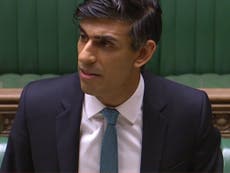Foreign aid cut will lead to ‘significant’ increase in child deaths, experts warn
Health body says government plan could have ‘negative impacts lasting generations’
Your support helps us to tell the story
From reproductive rights to climate change to Big Tech, The Independent is on the ground when the story is developing. Whether it's investigating the financials of Elon Musk's pro-Trump PAC or producing our latest documentary, 'The A Word', which shines a light on the American women fighting for reproductive rights, we know how important it is to parse out the facts from the messaging.
At such a critical moment in US history, we need reporters on the ground. Your donation allows us to keep sending journalists to speak to both sides of the story.
The Independent is trusted by Americans across the entire political spectrum. And unlike many other quality news outlets, we choose not to lock Americans out of our reporting and analysis with paywalls. We believe quality journalism should be available to everyone, paid for by those who can afford it.
Your support makes all the difference.The government’s decision to cut the UK’s foreign aid budget will lead to a “significant” increase in child deaths amid already severe disruption to health services caused by the coronavirus pandemic, the Royal College of Paediatrics and Child Health (RCPCH) has warned.
Chancellor Rishi Sunak announced last month that foreign aid would be cut by about £4bn next year due to the UK reducing its commitment to spend 0.7 per cent of national income on aid to 0.5 per cent.
In a joint statement with the International Child Health Group (ICHG), the RCPCH warned against the proposal and argued that the UK’s aid spending was an important “moral commitment” and enhanced the country’s reputation on global health.
“The collateral impact of the Covid-19 pandemic is causing severe disruption to preventive and curative health services in the poorest settings, particularly for children,” the statement said.
“Estimates suggest that more than a million excess child deaths could occur as a result.
“To reduce our commitment further, just as global needs intensify, will result in significant further loss of life, with negative impacts lasting generations.”
The RCPCH added that foreign aid was important because it could save children’s lives and “set them on a path to life-long health”
“Without doubt, aid should be closely scrutinised and used to achieve maximum benefit; aid should be able to show ‘value for money’,” the health body said.
“Saving children’s lives is an imperative - a moral act and one of the best and most effective investments for future global growth.”
Although the government has said the aid cut is temporary, ministers have not yet set out a clear date for when the 0.7 per cent target will be met again - raising concerns among senior Tories that the reduced spending could become permanent.
“It’s a relatively small amount of money in the overall scheme of things for us, but it’s an enormous amount of money for the world’s poorest people,” Andrew Mitchell, a former Tory chief whip, said in November.
Former prime ministers Tony Blair and David Cameron have also criticised the decision, warning that it would be a “strategic mistake” to reduce aid spending.
In addition, more than 150 development and humanitarian charity leaders, including Save The Children, Greenpeace UK and Unicef UK, wrote to Boris Johnson in November to urge him to rethink the decision.
“Now is not the time to renege on our promise to spend 0.7 per cent of our gross national income on aid and development,” they wrote.
“Stepping back from our international commitments is not the solution and risks damaging the UK's standing globally as we define our role in the world post-Brexit.”

Join our commenting forum
Join thought-provoking conversations, follow other Independent readers and see their replies
0Comments